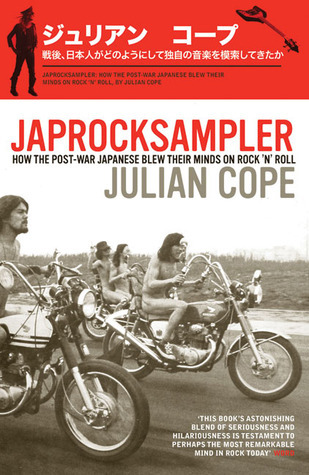per arrivare a dare la caccia a dischi usciti e diffusi solo in giappone negli anni '70 bisogna essere divorati da una curiosità musicale inappagabile, che non prevede di porsi limiti di spese di frustrazioni e non arretra difronte alla scarsità di fonti reperibili: nel caso si decide di afrontare una simile ricerca "japrocksampler" è il libro definitivo, nonchè probabilmente l'unico non in giaponese sull'argomento.
cope mette da parte lo stile usato in "krautrocksampler", analizzando la storia della musica rock giapponese a partire dal contesto in cui viene ad evolversi, cercando quindi di spiegarne la storia vera e propria (magari analizzandola nel raffronto con ciò che accadeva all'estero, come fa ottimamente parlando del '68), la scena artistica e culturale (che discreto peso avranno nella musica rock nipponica: si vedano le schede su j.a.cesar e sui tokyo kid brothers, ma non solo...), oltre a mondi limitrofi come la musica di ricerca e il jazz, arrivando quindi a spiegare il giappone in un modo sicuramente inedito nella critica rock, raramente attenta ad analizzare la società in cui le scene musicali si sviluppano.
insomma, "japrocksampler" è lontanissimo dai deliri lisergici di "krautrocksampler", e forse è più vicino al cope che studia i megaliti di "the modern antiquarian", a suo modo stimato anche da chi certe cose le studia per mestiere e non per hobby; e forse proprio per questo il libro potrebbe rivelarsi lettura godibile anche per chi del rock giapponese è -ed intende continuare ad essere- felicemente ignaro ma ha voglia di leggere un testo sulla musica che sappia essere intrigante e divertente, documentato senza sembrare saccente, frutto di una passione sincera e non un tentativo di creare una moda nuova intorno a una delle poche scene musicali rimaste quasi inesplorate.
al di la del contenuto, poi, cope si rivela scrittore sempre più sicuro di se, capace con poche frasi di portarti dentro uno studio di registrazione, dietro le quinte dell'edizione giapponese di "hair" o sul palco di un festival: a questo punto non vedo l'ora che si decida ad esordire anche come romanziere...

